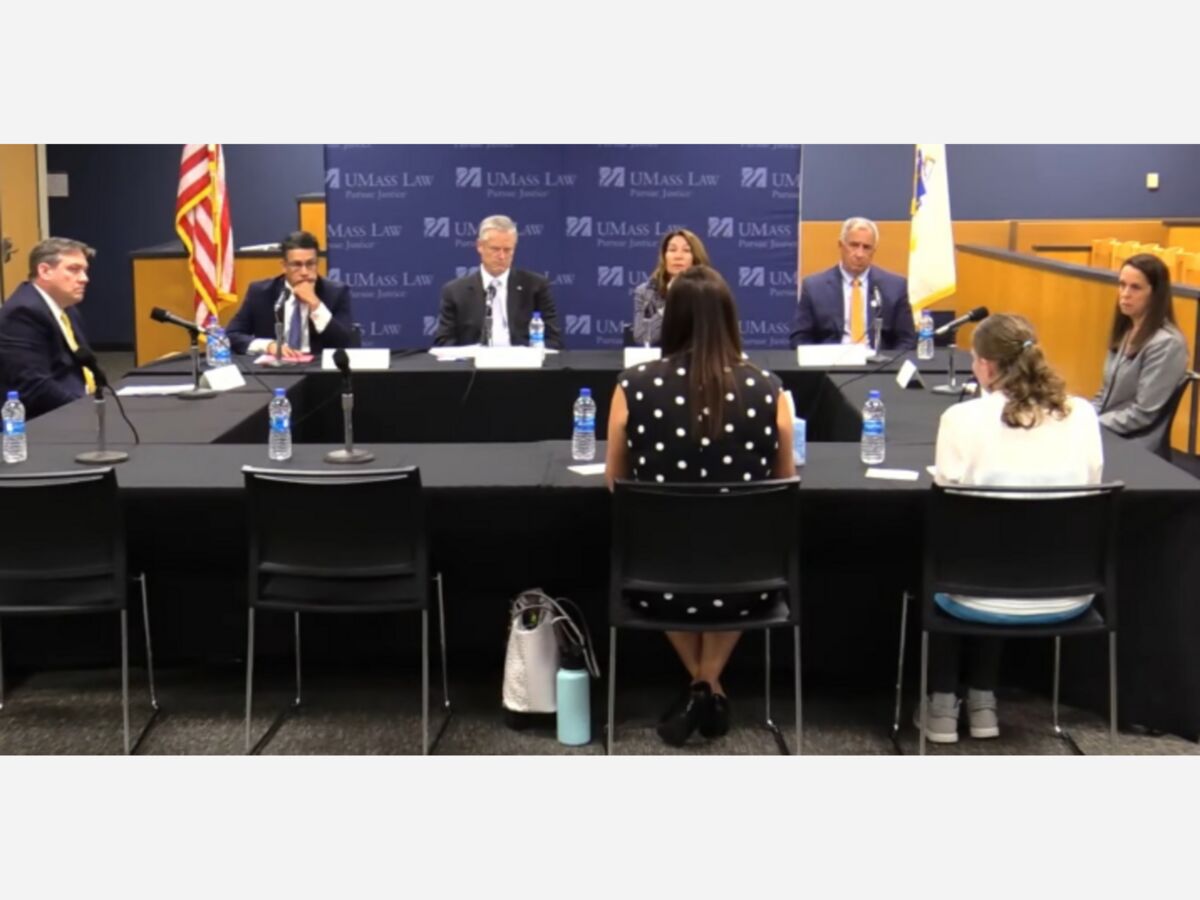Image

After listening and taking notes while survivors of sexual and domestic violence recounted some of the worst days of their lives and explained the trauma that they deal with to this day because of their experiences with the court system, Gov. Charlie Baker apologized.
"I can't tell you how sorry I am that state government let you down," he said. "There's no other way to put it. State government let you down because we didn't have the vision or the knowledge to understand what was actually going on day to day to day."
The roundtable with victims and survivors at UMass Law School in Dartmouth was the fifth that the governor has held as he prioritizes passage of his bill that would make it easier for police and the courts to detain defendants deemed a risk to the community in his final year in office, having seen it sunk in the Legislature in previous sessions.
But by giving a megaphone to survivors and highlighting their stories, Baker has been putting pressure on lawmakers to either address the issue or choose inaction in the face of emotional calls from victims. While Beacon Hill may have been blind to the problems before, the governor said Monday that "nobody can make that claim anymore."
"It's all out there for everybody to see as pure as day that unless we do something about this, people will have stories and experiences that can only be described as horrific and tragic here in a state that claims to be so progressive and so interested in protecting those who need the help most," Baker said.
The governor's bill (H 4290) would allow judges to consider a defendant's criminal history and not just the specific charges before them when making a decision on pre-trial release and expand the list of offenses that can be used to hold a defendant as a dangerous person to include crimes like child rape, child sexual assault, child pornography and human trafficking.
At UMass Law School on Monday, Baker and Lt. Gov. Karyn Polito heard from a woman named Kelsey who is the survivor of childhood rape and exploitation at the hands of someone she said was a "trusted caretaker" of her. She wanted to highlight how abusers do not need to be violent to be dangerous.
"When I was really young, I remember my abuser telling me not to say anything or we'd both get in trouble. To a five-year-old, that could be all it takes. That's all it took in my situation. No child wants to get in trouble," she said. "A pedophile could completely destroy a child's entire life without ever being violent and those type of people are still a danger."
Kelsey said she remembers thinking that her abuser would go to jail right away, but he did not. She said that while her abuser was given a "slap on the wrist ... I feel I was given a life sentence" of battling depression.
"His sentence did not feel like justice at all, especially because he was released early for good behavior," she said. She added, "I spent more time in locked mental health facilities than he did" in prison.
The governor's legislation would also permit prosecutors to seek a dangerousness hearing at any point in a criminal proceeding, not just at the outset, and ask that a defendant be held until the conclusion of a trial, rather than the 120 days allowed in District Court or 180 days in Superior Court.
The governor and lieutenant governor also heard from Danielle, a domestic violence survivor who was attacked by her husband of 20 years. He was initially deemed dangerous but Danielle said she had to testify at three different dangerousness hearings while the charges were pending.
"Let me tell you, testifying in a dangerousness hearing in front of the person who tried to kill you and a defense attorney who is trying to break you down is no easy task. It was necessary to save my life and my children's lives," she said. "This is a traumatizing experience and I felt like having to do it again and again was like fighting for my life, just like I did the day I was attacked. Each time, I was filled with anxiety and fear of what the outcome would be."
Baker's so-called dangerousness bill has drawn skepticism from some lawmakers and remains bottled up on Beacon Hill. With its latest extension, the Judiciary Committee has given itself until June 30 to decide whether the governor's proposal should advance.
Baker filed similar bills in 2018 and 2019 but they did not advance from committee amid criticism from the American Civil Liberties Union and others.
At one point, it appeared as if there had been a breakthrough on at least one aspect of Baker's bill. Then-House Speaker Robert DeLeo told reporters in June 2019 that the House planned to take up "part of" Baker's dangerousness bill that month, but the bill never moved out of the Judiciary Committee by the time the last session ended.
As they make their final push for the bill, the governor and lieutenant governor have hosted several roundtable events allowing survivors to recount their personal stories and discuss how they would have been affected by the administration's legislation.
In late May, taking advantage of the Senate's budget week to catch lawmakers in person at the State House, some survivors took to Beacon Hill to visit with senators to discuss the governor's bill. Minority Leader Bruce Tarr offered an amendment to the budget that included many of the same ideas as Baker's bill, but that was summarily rejected.
-- State House News Service